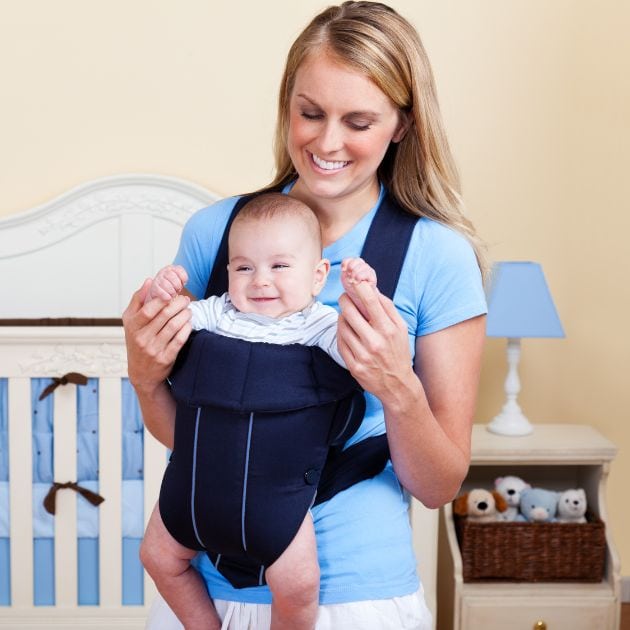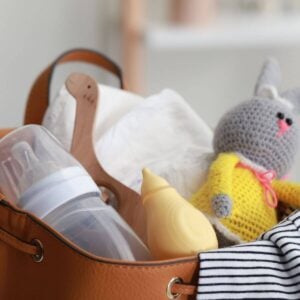I don’t think I was naive about breastfeeding our daughter. I knew it would take time to figure out, and I accepted that the process wouldn’t always be easy. What I didn’t prepare for, however, was the near-mental breakdown I’d experienced when she started cluster feeding.
Okay, a mental breakdown is slightly dramatic and exaggerated, but I’m not lying when I tell you I caught myself searching the phrase, “How to survive cluster feeding” on more than one occasion.
I thought the hard part of becoming a nursing mom would be the nipple pain, milk supply issues, and breastfeeding holds I would have to master.
Yes, those things are challenging, but once you get a handle on them, it almost feels like riding a bike–almost.
No matter how good I got at breastfeeding, no one could prepare me for how BADLY cluster feeding sessions can suck. Not only are they physically exhausting and demanding, but they also lead to a plethora of extra breastfeeding woes and worries.
Am I producing enough milk?
Is there something wrong with my baby?
Am I nursing incorrectly?
Does my child HATE me?
WHAT THE HELL IS HAPPENING??
I can’t speak to EVERY breastfeeding scenario, but as a general rule, you, mama, aren’t doing anything wrong.
Cluster feeding in babies is a normal, albeit frustrating, part of many parenting journeys.
It has little to do with newborn “complications” and plenty to do with your baby’s sudden desire to eat as much as possible.
The good news is that there are plenty of simple ways to ensure you and your little one get the comfort and care you both need during a cluster. Below you’ll find a list of trusted cluster feeding tips that can make the process less stressful for everyone involved.

This site contains affiliate links, meaning that we earn a small commission for purchases made through our site. We only recommend products we personally use, love, or have thoroughly vetted.
- What is Cluster Feeding (and Why Do Babies Do It?)
- Why Do Newborn Cluster Feeds Stress Mamas Out?
- 13 Cluster Feeding Tips You Need to Try
- 1. Remember Baby Clusters are Temporary
- 2. Switch Your Nursing Position
- 3. Ask for Help
- 4. Create a Comfortable Breastfeeding Station
- 5. Plan for Your Baby’s Cluster
- 6. Buy a Great Breastfeeding Pillow
- 7. Take Care of Your Nipples
- 8. Try Babywearing Your Newborn During Cluster Feeds
- 9. Practice Self-Care
- 10. Look for Other Ways to Help Baby Relax
- 11. Drink Plenty of Water
- 12. Eat Something Before the Cluster Begins
- 13. Talk to a Certified Lactation Consultant or Pediatrician
- Don’t Let Cluster Feeds Cause More Parenting Anxiety!
What is Cluster Feeding (and Why Do Babies Do It?)
After the first couple weeks with a new baby, you’ll start to get into a routine with their feeding schedule. However, that whole pattern will likely fall to the wayside during a baby’s cluster.
Instead of eating once every 2-3 hours, which is normal newborn behavior, your precious darling might act like they’re starving every 30 minutes to an hour.
Usually, they’ll continue eating like this for a few hours at a time.
But why?
When their regular eating habits seem to serve them just fine, why do they suddenly act like they’re starving?
There are several reasons your little one might start cluster feeding. Four of the most common ones are listed below:
1. Growth Spurts
Around three weeks, six weeks, three months, and six months, your baby will probably go through growth spurts. During these cycles, there’s a good chance they’ll want to eat more than usual and might seem fussier, too.
The increase in calories helps support the physical changes happening in your baby’s body and the developmental leaps they’re making.
2. Changes in Sleep Patterns
Most of us dream of when our newborns finally start sleeping for longer stretches at night. Before they master this skill, however, you might notice an uptick in the number of feeds they want in the early evening hours.
Infants often wake up every few hours to eat during the night. As they transition to sleeping through the night, they might cluster feed to fill up right before bed.
3. Colds or Teething
While searching for tips on how to survive cluster feeding, you might want to look for ways to comfort your little one during colds and teething. If a baby isn’t feeling well, they might use feeding as a relaxation technique.
Per Dr. Harvey Karp from Happiest Baby, when a baby sucks, the reflex naturally lowers their heart rate, blood pressure, and stress levels.
This explains why our little ones often use newborn cluster feeding as a calming technique. Babies don’t understand sickness and discomfort the same way we do as adults. All they know is they feel bad and want the things that usually make them better.
4. Slower Milk Flow in the Evenings
While the calorie content of breastmilk is sometimes higher in the evenings, milk flow can slow down.
Since babies quickly discover that nursing longer, more often, or more vigorously can increase the chances of a letdown, which is the reflex that allows milk to flow more freely, they might start clustering to get more milk.
Why Do Newborn Cluster Feeds Stress Mamas Out?
No matter how often you hear that breast milk or formula cluster feeding is normal, it doesn’t mean the experience will feel any less trying or emotional.
You might feel limited by what you can do during your baby’s cluster, overwhelmed by a fussy baby, or just ready to have your body back for a bit. Sensations and struggles like these can end up causing increased stress, exhaustion, and frustration. This feeling is completely normal.
Before you let your baby’s feeding habits get the best of you, though, please keep in mind that there are ways to streamline the situation.
The list below contains thirteen trusted tips for navigating a newborn’s cluster feed at night!

13 Cluster Feeding Tips You Need to Try
From high-quality nursing pillows to stress management, check out these 13 tips for surviving your baby’s cluster feed in the late afternoon or early evening.
1. Remember Baby Clusters are Temporary
First things first: I promise your baby’s cluster WON’T last forever! When you’re in the thick of non-stop feeds, it might seem like your newborn will never return to their usual eating habits. On average, though, most clusters only last a few days at a time.
2. Switch Your Nursing Position
When your baby goes through a cluster feeding binge, using the same nursing position time after time might become tiring. Give your arms, back, shoulders, and neck a break by switching up the breastfeeding holds you use throughout your little one’s cluster feed.
If you’re early on in your breastfeeding journey during a cluster and struggling with latching, adjusting your position can help with this, too.
3. Ask for Help
If you’re a breastfeeding mama, you can’t exactly loan out your boobs for someone else to use during a cluster feed. What you can do is seek out help in other ways.
Some suggestions are having your partner give the baby a bottle for a few feeds or letting a friend or family member tend to your little one between nursing sessions.
There is also absolutely no shame in calling up your lactation consultant for more help, tips, and encouragement!
4. Create a Comfortable Breastfeeding Station
If you know you’ll get stuck in the same area for hours while your baby is cluster feeding, you might as well design a comfortable breastfeeding station!
Some things you might want to add to this area include:
- Water Bottle
- Breastfeeding Snacks
- Phone Charger
- Tablets or Kindle
- Nursing Essentials, i.e., nipple cream, breast pads, etc.
5. Plan for Your Baby’s Cluster
Here’s the thing about newborn cluster feeds in nursing or bottle-fed babies; they usually strike at the same time every day or night.
If you’re getting close to your baby’s non-stop hunger pain witching hour, why not plan ahead? Make dinner, pick up the house, charge your phone, or do whatever you feel you can’t do while your infant is clustering.
6. Buy a Great Breastfeeding Pillow
From the classic Boppy to the popular My Brest Friend products, nursing pillows can make or break your breastfeeding experience.
Purchasing a high-quality breastfeeding pillow is one of my favorite tips for moms who want to know how to survive baby’s cluster feeds.
Not only do they help keep you comfortable, but they can also make latching and nursing holds easier to manage.
7. Take Care of Your Nipples
Your nipples will see a lot of activity during newborn cluster feeds. Instead of starting to worry about cracks, bleeding, and pain, why not be proactive in taking care of them?
Products like nipple cream and nipple shields can protect them and help heal any problems that might arise. Since breast milk has natural healing properties, I used to squeeze out a little extra after feeds to help with my nipples, too.
8. Try Babywearing Your Newborn During Cluster Feeds
While only some have the coordination required to babywear and nurse at the same time (I know I sure didn’t!), if you can figure it out, you can multi-task during your newborn baby’s cluster!
Whether you use a newborn sling or baby carrier, babywearing during cluster feeds gives you a hands-free way of caring for your infant while still getting simple tasks done around the house.
9. Practice Self-Care
As if we all don’t already deal with enough “mom overwhelm” or parenting stress, how about we throw in a baby cluster to make things even more challenging?
When you’re dealing with cluster feeding and your baby wants nothing more than to eat non-stop and fuss, the result can be pretty detrimental to your mental health. That’s where self-care and stress management comes in.
Find simple ways to take care of yourself during your newborn‘s cluster.
Whether taking a few minutes to hop in the shower, reading a chapter of your book, or getting on a call with your friend, carving out time for things you love is essential.
It’s not uncommon to feel like we’re losing ourselves while in the throes of parenting. Practicing self-care for moms is crucial to surviving your little one’s cluster feeds.
10. Look for Other Ways to Help Baby Relax
So, it’s that special time of day when your little one starts acting like they’re starving and wailing like a banshee. If you think there’s a chance your baby is using cluster feeding as a coping mechanism for discomfort, you can always try to find other ways of helping them relax.
Some suggestions include the following:
- Use a White Noise Machine
- Give Them a Warm Bath
- Put Them in a Traditional or Arms Up Swaddle
11. Drink Plenty of Water
Did you know that if you’re not drinking enough water, it can negatively affect your milk production? When your baby wants to eat more than usual, a sudden drop in supply is the last thing you need!
While no rule states that you have to drink tons of extra water while nursing, you WILL want to stay hydrated.
12. Eat Something Before the Cluster Begins
I’m not going to lie–during the early days of parenthood in our home, we spent plenty a witching hour and cluster feed attempting to eat our dinner while simultaneously holding our fussy daughter.
This usually led to cold meals and baby pajamas stained with dropped bites.
I don’t recommend this technique.
Instead of trying to sneak bites between feeds, why not eat something before your little one starts to cluster for the day? Even if it’s just a small snack, it will help you get through until you can eat dinner. This prevents getting hangry while cluster feeding, and no one wants that.
13. Talk to a Certified Lactation Consultant or Pediatrician
It’s easy to tell you that cluster feeding is normal behavior, and there’s no need to worry. Many of us will still fret over whether there’s a problem, though, and that’s okay.
Don’t hesitate to seek professional medical advice if you’re concerned.
By making an appointment with a professional lactation consultant or your little one’s doctor, you can get the answers you need to move forward stress-free.
Still trying to figure out whether it’s time for an appointment or not? Some signs your baby is getting enough milk include:
- Plenty of Dirty and Wet Diapers
- Weight Gain
- Acting Content After a Feed
- Visible Swallowing While Nursing

Don’t Let Cluster Feeds Cause More Parenting Anxiety!
Cluster feeds can become exhausting, overwhelming, and just plain irritating. Please remember that most babies, whether they drink breastmilk or formula, will go through this behavior at some point.
Keep reminding yourself that this is a temporary chapter in your parenting story.
While being stuck to a nursing, fussy baby might seem like a challenge, this is a process they need for their growth, development, and comfort. Take care of yourself, and try to appreciate the extra snuggles while they last!
So, what do you think – do you have the tools you need to survive cluster feeding now?










